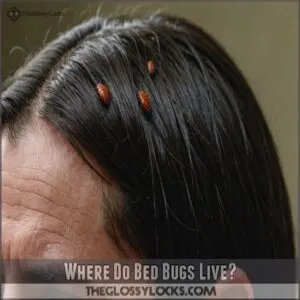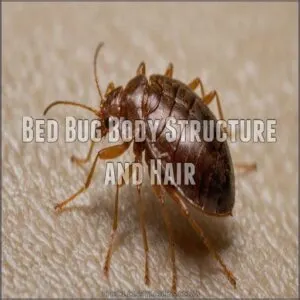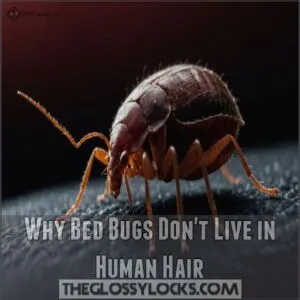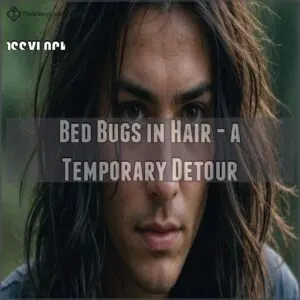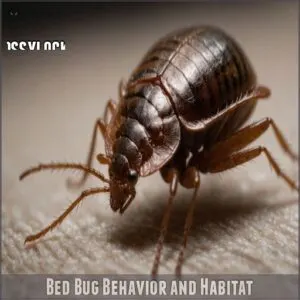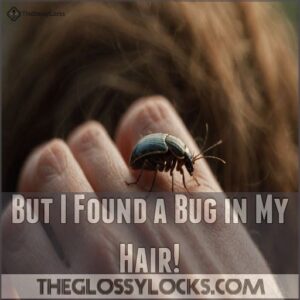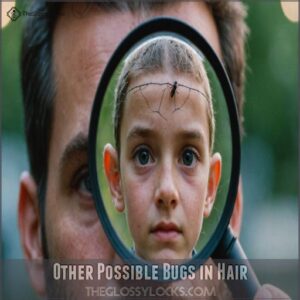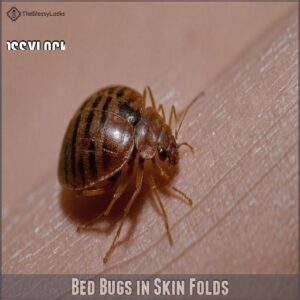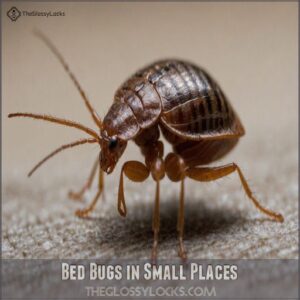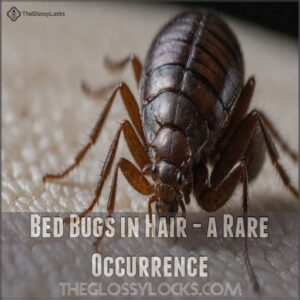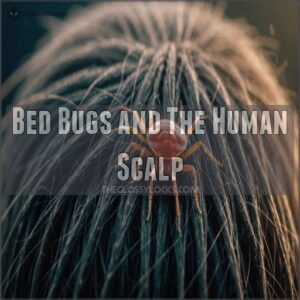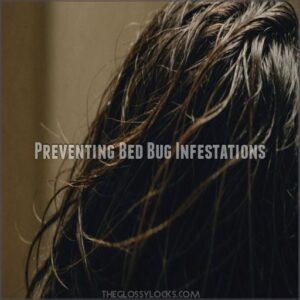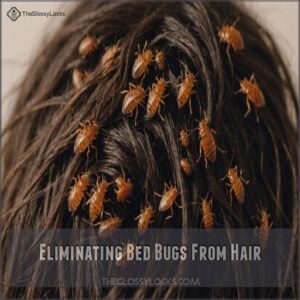This site is supported by our readers. We may earn a commission, at no cost to you, if you purchase through links.
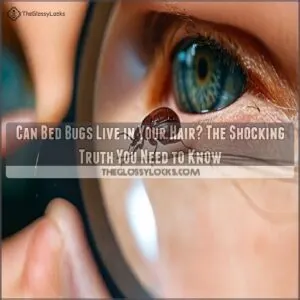 Ever had that creepy-crawly feeling in your hair? You might wonder, "Can bed bugs live in your hair?" Well, breathe easy! While these tiny vampires love your bed, they’re not fans of your luscious locks. Bed bugs aren’t built for hair-surfing – their flat bodies and claws are better suited for fabric-hopping. They prefer cozy mattress seams to your scalp’s terrain.
Ever had that creepy-crawly feeling in your hair? You might wonder, "Can bed bugs live in your hair?" Well, breathe easy! While these tiny vampires love your bed, they’re not fans of your luscious locks. Bed bugs aren’t built for hair-surfing – their flat bodies and claws are better suited for fabric-hopping. They prefer cozy mattress seams to your scalp’s terrain.
That said, a stray bug might take a wrong turn and end up in your ‘do, but it’s just passing through. If you’re finding persistent buddies in your hair, you’re likely dealing with a different creepy-crawly cast. Stick around to learn how to tell these mini-monsters apart and keep your hair bug-free!
Table Of Contents
- Key Takeaways
- Where Do Bed Bugs Live?
- Can Bed Bugs Live in Your Hair?
- Bed Bug Behavior and Habitat
- But I Found a Bug in My Hair!
- Other Possible Bugs in Hair
- Bed Bugs Hide in Many Different Places
- Bed Bugs and The Human Scalp
- Preventing Bed Bug Infestations
- Eliminating Bed Bugs From Hair
- Frequently Asked Questions (FAQs)
- Can bedbugs live in hair?
- Can bed bug bites cause hives and welts?
- Do bed bugs cling to hair?
- Do bed bugs eat human hair?
- Can bed bugs lay eggs in human hair?
- Do bed bugs live on your head?
- Where do bed bugs hide in your body?
- Do bed bugs stay on your skin after a shower?
- Can bed bugs stay on your clothes all day?
- Can I carry bed bugs on my body?
- Can bed bugs jump or fly onto your head?
- Do bed bug bites on the scalp look different?
- How long can bed bugs survive in hair products?
- Can bed bugs transmit diseases through hair contact?
- Are certain hair types more attractive to bed bugs?
- Conclusion
Key Takeaways
- Bed bugs aren’t built for living in your hair. They prefer hiding in mattresses and furniture instead of navigating your scalp’s oily and active environment.
- Although a bed bug might take a detour through your hair, they’re not going to settle in, as their body structure is unsuited for hair clinging.
- If you find a bug in your hair, it’s more likely a one-time visitor or a different type of bug, such as lice or fleas, rather than a bed bug infestation.
- Keep your hair bug-free by maintaining good hygiene, regularly inspecting for pests, and using hot water to wash away any potential hitchhikers.
Where Do Bed Bugs Live?
You might think bed bugs only hide in beds, but these sneaky pests have a knack for finding cozy spots all over your home.
From the cracks in your headboard to the folds of your favorite armchair, these tiny vampires can turn your living space into their personal buffet.
Common Places Bed Bugs Hide
Behind the scenes of your cozy bedroom, bed bugs are sneaky squatters with a knack for hide-and-seek.
These tiny terrors love to hunker down in:
- The nooks and crannies of your mattress seams
- The dark underbelly of your favorite armchair
- The depths of your cluttered closet, nestled in folded clothes
Don’t let their name fool you – beds aren’t their only hangout. They’ll crash anywhere warm and close to their midnight snack (that’s you!). Keep your eyes peeled!
Public Spaces and Bed Bugs
Creepy crawlies aren’t just lurking in your bed – they’re out on the town too!
You might be rubbing shoulders with bed bugs in unexpected places.
From your morning commute to a night at the movies, these tiny hitchhikers are always looking for a free ride.
Let’s take a peek at where you might encounter these unwelcome guests:
| Location | Risk Level | Prevention Tips |
|---|---|---|
| Buses | High | Inspect seat, keep belongings off floor |
| Hotels | Very High | Check mattress, use luggage rack |
| Movie Theaters | Medium | Avoid fabric seats, keep jacket on lap |
| Libraries | Low | Check borrowed books, avoid upholstered chairs |
| Offices | Medium | Be wary of shared furniture, keep personal items separate |
Don’t let the bed bugs bite – or hitch a ride home with you!
Stay vigilant and you’ll keep these pesky travelers at bay.
Bed Bugs in Furniture and Mattresses
Your cozy bed might be harboring uninvited guests.
Bed bugs love to nestle in the nooks and crannies of your furniture and mattresses.
They’re master hide-and-seek champions, so you’ll need to be a detective.
To shield your mattress, consider investing in a protective mattress bug encasement.
Look for tiny rust-colored stains, shed skins, or the bugs themselves.
Don’t panic!
Use mattress encasements and regularly inspect your furniture.
Remember, prevention is key in this bug battle.
Can Bed Bugs Live in Your Hair?
You might be worried about bed bugs making a home in your hair, but here’s some good news: these pesky critters aren’t built for life on your scalp.
While it’s possible for a bed bug to take a quick detour through your locks, they’re much happier hiding in your mattress or furniture than trying to navigate your hair forest.
Bed Bug Body Structure and Hair
Bed bugs’ body structure isn’t built for life in your locks.
These flat, oval critters are about the size of an apple seed – too big to navigate through hair follicles easily.
Their legs aren’t designed for gripping hair shafts, and they struggle to move through the oily landscape of your scalp.
While they might take a quick detour through your hair, it’s not their ideal habitat.
Why Bed Bugs Don’t Live in Human Hair
Despite their name, bed bugs aren’t fans of your locks.
They’ve got their reasons:
- Hair’s too slippery and oily for their liking
- Your scalp’s constant movement is a bed bug’s worst nightmare
- Hair follicles don’t provide the cozy hiding spots they crave
Think of your hair as a rollercoaster – thrilling for you, terrifying for bed bugs.
They much prefer the stable ‘ground’ of your mattress or furniture.
So, while they might take a quick detour through your hair, they won’t be setting up camp there.
Bed Bugs in Hair – a Temporary Detour
Curiosity might lead you to wonder if bed bugs can set up camp in your hair.
While it’s not their preferred hangout, these sneaky critters might use your locks as a quick pit stop.
Think of your hair as a temporary bridge for bed bugs on their journey to cozier spots.
Unlike dog ticks which can crawl through human hair, but don’t live on it read about dog ticks in human hair.
Let’s break down this hair-raising situation.
| Bed Bug Behavior | Hair Impact |
|---|---|
| Movement | Quick escape route |
| Shelter | Short-term refuge |
| Feeding | Unlikely scalp target |
| Reproduction | Not suitable for eggs |
| Long-term stay | Highly improbable |
Don’t worry, though.
Your hair isn’t their ideal home sweet home!
Bed Bug Behavior and Habitat
You might think bed bugs are just lazy couch potatoes, but these sneaky bloodsuckers have some surprising habits.
They’re night owls who love to play hide-and-seek in your furniture, waiting for the perfect moment to crash your bedtime party.
Nocturnal Nature of Bed Bugs
While bed bugs don’t set up camp in your hair, they’re night owls with a taste for midnight snacks.
These sneaky bloodsuckers come out when you’re fast asleep, like tiny vampires at a pajama party.
They’re masters of hide-and-seek, tucking away in cracks and crevices during the day.
As dawn breaks, these nocturnal nuisances scurry back to their hiding spots, leaving you scratching your head – literally and figuratively!
Feeding Habits of Bed Bugs
You might think those night-loving bed bugs are picky eaters, but they’re not!
These tiny vampires have a single-item menu: your blood.
They’re sneaky feeders, creeping out when you’re fast asleep to grab a quick meal.
Don’t worry, though – they’re not setting up camp in your hair.
Bed bugs prefer exposed skin, leaving those telltale bite marks in clusters or lines.
It’s their version of a midnight snack!
Preferred Hideouts of Bed Bugs
Bed bugs are masters of hide-and-seek, but not in your hair!
These sneaky critters prefer cozy spots like mattress seams, furniture cracks, and even your electronics.
They’re all about easy access to their midnight snacks (that’s you!).
Luggage and clothing are their favorite travel buddies.
So, while you’re worrying about your scalp, they’re probably lounging in your bedside table, plotting their next move.
But I Found a Bug in My Hair!
You’re running your fingers through your hair and suddenly feel something crawl – yikes!
Before you panic, let’s figure out what kind of uninvited guest you’ve stumbled upon and what to do next.
Possible Reasons for Finding a Bug in Hair
Hold on to your hairbrush.
Finding a bug in your locks doesn’t always mean you’ve got bed bugs setting up camp on your scalp, and it’s also not a sign of an allergic reaction like those caused by hair dye allergic reactions, which can cause itchy scalp after hair coloring.
It could be a case of accidental infestation or a temporary presence after recent exposure.
Maybe you’ve had a close encounter with a nearby infestation, and a sneaky bed bug hitched a ride.
Don’t panic – it’s more likely a one-time visitor than a full-blown hair party.
Identifying The Type of Bug in Hair
Finding a creepy crawler in your hair can send shivers down your spine.
But don’t panic just yet!
Let’s play detective and figure out what’s bugging you.
Not all hair-dwelling critters are created equal, and knowing your enemy is half the battle.
Here’s a quick guide to help you identify the culprit:
- Tiny, wingless, and claw-like legs? Might be lice!
- Reddish-brown and oval-shaped? Could be a bed bug hitchhiker.
- Small, dark, and super jumpy? Possibly fleas taking a detour.
- Eight legs and barely visible? Spider mites might be exploring your ‘do.
Remember, bed bugs prefer furniture over your fabulous locks.
So, take a deep breath and let’s crack this case together!
What to Do if You Find a Bed Bug in Hair
Found a hitchhiker in your hair? Don’t panic!
Grab a fine-toothed comb and give your locks a thorough once-over.
If it’s a bed bug, you’ll want to inspect your home pronto.
Use a hot hair dryer to zap any stragglers, then wash your hair with your regular shampoo.
For peace of mind, consider calling in the pros for a thorough home inspection and treatment plan.
Other Possible Bugs in Hair
While bed bugs in your hair are rare, there are other creepy crawlies that might make your scalp their home.
Let’s explore some common hair-dwelling bugs that could be causing you grief, from the notorious head lice to the less-expected fleas.
Head Lice and Their Differences
If you’ve got an itchy scalp, head lice might be the culprit, not bed bugs.
These tiny troublemakers are like unwanted hair accessories, setting up camp right on your scalp.
Unlike their bed-dwelling cousins, lice are hair-huggers, causing itching and irritation.
They’re not just a kid thing either – adults can get them too.
Don’t panic though, head lice treatment is pretty straightforward.
Just remember, these critters are more of a nuisance than a health hazard.
Fleas and Their Feeding Habits
Fleas are tiny bloodsucking insects that can make your hair their temporary home.
While they prefer your furry friends, these pesky jumpers might hitch a ride on you.
To keep them under control, consider using flea shampoo products as part of their prevention.
Unlike bed bugs, fleas can live in your hair, causing itchy bites on your scalp.
They’re quick, nimble, and hard to spot.
To keep these vampires at bay, regularly groom your pets and use flea prevention products.
Your scalp will thank you!
Other Types of Bugs Found in Human Hair
Your hair might be hosting some uninvited guests!
While bed bugs prefer furniture, other critters can set up camp on your scalp.
Let’s scratch the surface of these hair-raising hitchhikers:
- Head lice: These tiny vampires feast on your blood and lay eggs in your hair.
- Mites: Microscopic arachnids that can cause itching and inflammation.
- Ticks: These bloodsuckers can latch onto your scalp during outdoor adventures.
- Scabies: Burrowing mites that cause intense itching and a rash.
Don’t let these bugs bug you!
Regular checks keep your locks pest-free.
Bed Bugs Hide in Many Different Places
You’d be surprised at the sneaky spots where bed bugs can hide – from tiny cracks in your furniture to the folds of your clothes.
While finding these pesky critters in your hair is rare, they’re masters at squeezing into small spaces all around your home.
Bed Bugs in Skin Folds
Between the sheets of your skin, those pesky bed bugs might be playing hide and seek.
While they don’t set up camp in your hair, they love cozy skin folds.
Think armpits, behind knees, or the crease of your elbow – perfect spots for a bed bug staycation.
Don’t panic!
Regular hygiene and a keen eye during your nightly routine can help you catch these sneaky squatters before they settle in.
Bed Bugs in Small Places
Imagine playing an unsettling game of hide-and-seek with bed bugs.
These tiny terrors are masters at squeezing into the smallest nooks and crannies of your home.
They’re not just mattress dwellers; they’re everywhere you least expect.
Here’s where these sneaky pests might be lurking:
- Behind electrical outlet covers
- Inside the hollow legs of furniture
- Between the pages of books
Don’t let their size fool you – bed bugs are expert hiders, making prevention and control a real challenge.
Bed Bugs in Hair – a Rare Occurrence
Despite their sneaky nature, bed bugs rarely set up shop in your hair.
These crafty critters prefer cozy cracks and crevices to your luscious locks.
Let’s break down the hair-raising facts:
| Bed Bug Behavior | In Hair | In Furniture |
|---|---|---|
| Hiding | Uncommon | Preferred |
| Egg-laying | Unlikely | Common |
| Movement | Difficult | Easy |
| Feeding | Temporary | Regular |
| Detection | Noticeable | Hidden |
While finding a bed bug in your hair isn’t impossible, it’s more like a wrong turn than a planned pit stop.
Bed Bugs and The Human Scalp
Ever found yourself scratching your head, wondering if bed bugs could be hiding in your hair?
While these pesky critters might occasionally end up on your scalp, they’re not keen on setting up camp there, preferring cozier spots like your mattress or furniture instead.
Attraction to Human Scalp
Your scalp might seem like a cozy spot for bed bugs, but it’s not their ideal home.
While they’re drawn to your body heat and the scent of your skin, bed bugs aren’t fans of your scalp’s oily environment.
They prefer smooth surfaces to your hair follicles.
Don’t worry, though – these pesky critters are more likely to hang out in your mattress than your mane.
Your locks are safe from becoming a bed bug resort!
Bed Bugs in Scalp – a Rare Infestation
Once in a blue moon, bed bugs might end up in your scalp.
But don’t panic, as this is often a case of mistaken identity – it could be an itchy scalp condition, like scalp tenderness caused by folliculitis or psoriasis, that’s making you feel like you have unwanted critters.
They’re like fish out of water up there, struggling your luscious locks.
While it’s rare, if you’re feeling itchy or spotting tiny bugs, don’t jump to conclusions.
It could be other scalp-loving pests.
Always double-check before freaking out about a bed bug hair infestation.
Removing Bed Bugs From The Scalp
Dealing with bed bugs in your hair? Don’t worry, we’ve got your back!
Start by giving your scalp a good scrub with hot water and shampoo.
Then, grab a hot comb and run it through your locks – these critters can’t stand the heat!
For extra oomph, tea tree oil is also a natural antimicrobial agent that fights bacteria and fungal infections, making it a popular ingredient in beard care products. For extra oomph, try a tea tree oil treatment. It’s like a spa day for your head, minus the unwanted guests!
Preventing Bed Bug Infestations
You don’t need to become a bed bug detective to keep these sneaky pests at bay.
With a few simple tricks up your sleeve, like using mattress encasements and washing your linens regularly,
you’ll turn your home into a bed bug-free fortress.
Using Mattress Encasements
Think of mattress encasements as your bed’s superhero cape against bed bugs.
These zippered covers create an impenetrable fortress, trapping existing bugs and preventing new ones from settling in.
Don’t let the bed bugs bite – invest in a high-quality encasement that’s bed bug-proof and escape-proof.
It’s like giving your mattress a protective hug, ensuring you sleep tight without those pesky invaders.
Sweet dreams, bug-free!
Washing Linens Regularly
Your bed’s like a five-star hotel for bed bugs, but you can kick them out with regular linen laundry.
Wash your sheets weekly in hot water (at least 130°F) to zap those sneaky critters.
Don’t forget your pillowcases and duvet covers!
Use a strong detergent and dry on high heat to finish the job.
It’s not just about cleanliness—it’s your first line of defense against these unwanted roommates.
Keep your bedding fresh, and sleep tight without the bite!
Vacuuming and Cleaning
Regular vacuuming is like giving bed bugs an eviction notice. It’s not just about clean sheets; you’ve got to tackle those sneaky hiding spots too.
Here’s your battle plan:
- Vacuum thoroughly, including cracks and crevices
- Use a stiff brush on mattress seams and upholstery
- Empty the vacuum outside immediately
Remember, bed bugs are masters of hide-and-seek. A deep clean every week keeps these unwanted roommates at bay. It’s like playing detective, but with a vacuum as your magnifying glass!
Eliminating Bed Bugs From Hair
Found a bed bug in your hair? Don’t panic! You can kick these unwanted guests out with a few simple tricks, from hot combs to high-heat hair drying.
Using Hot Combs and Brushes
Now that you’ve fortified your defenses, let’s heat things up!
Hot combs and brushes can be your secret weapons against those pesky bed bugs.
These tools don’t just style your hair; they can send those unwanted guests packing.
But before you go all Rambo on your locks, let’s break down the dos and don’ts:
| Tool Type | Effectiveness | Safety Tips |
|---|---|---|
| Hot Comb | High | Use on dry hair, avoid scalp contact |
| Brush | Moderate | Choose metal bristles, clean thoroughly after use |
| Electric | Very High | Maintain consistent temperature, use heat protectant |
Remember, folks, we’re aiming for bug-free, not barbecue.
So, keep it cool while you’re bringing the heat!
Washing Hair With Hot Water
Imagine turning your shower into a mini bed bug battleground.
Hot water can be your secret weapon against these pesky hitchhikers in your hair.
Crank up the heat to about 120°F (48.9°C) – that’s the sweet spot for zapping bed bugs without scalding your scalp.
To further boost your bed bug-fighting routine, consider simplifying your hair care with a no-poo method using bar soap alternatives.
But don’t go overboard; prolonged exposure might damage your luscious locks.
Remember, this isn’t a foolproof method, but it’s a great start in your bug-busting routine.
Drying Hair With High Heat
Cranking up the heat on your blow dryer isn’t just for style—it’s your secret weapon against bed bugs.
When shopping for a blow dryer, look for one with adjustable heat settings, such as those found at blow dryer heat products.
High heat can zap these pesky invaders, but don’t go overboard.
Keep your dryer moving to avoid scorching your scalp.
Think of it as a mini heat treatment for your hair.
Just remember, while you’re blasting those bugs, be gentle on your locks to prevent heat damage and keep your hair healthy.
Frequently Asked Questions (FAQs)
Can bedbugs live in hair?
Bed bugs don’t set up shop in your hair.
They’re not built for it and prefer cozy spots in furniture or mattresses.
You might find one hitchhiker, but they won’t stick around.
Your locks are safe from these tiny squatters!
Can bed bug bites cause hives and welts?
Bed bug bites can trigger nasty hives and welts on your skin.
Your body’s allergic reaction to their saliva causes these itchy, raised bumps.
They’re like mini battle scars from your nighttime encounters with these pesky critters.
Do bed bugs cling to hair?
Every hair on your head is safe from these pests.
Bed bugs don’t cling to hair; they’re not built for it.
Their flat bodies and feeding habits make your locks an unlikely hideout.
They prefer cozy furniture crevices instead.
Do bed bugs eat human hair?
Don’t worry, your hair’s safe from bed bugs‘ menu!
These tiny pests aren’t interested in munching on your locks.
They’re blood-suckers, not hair-eaters.
Your scalp might be on their radar, but your hair’s off-limits.
Can bed bugs lay eggs in human hair?
While bed bugs prefer furniture, they won’t set up shop in your hair.
Your locks are too oily and active for their liking.
They need rough surfaces like wood or fabric to lay eggs.
Rest easy, your hair’s safe!
Do bed bugs live on your head?
Bed bugs don’t set up camp on your head.
They’re like sneaky party crashers, preferring to hide in furniture and bedding.
Your hair’s too oily and active for their liking.
Rest easy, your scalp’s not their ideal hangout spot!
Where do bed bugs hide in your body?
Believe it or not, bed bugs don’t actually hide in your body.
They’re not body surfers, just expert hide-and-seekers in your living space.
These sneaky critters prefer cozy spots near you, like mattress seams, headboards, and furniture cracks.
Do bed bugs stay on your skin after a shower?
You’re in luck! Bed bugs don’t cling to your skin after a shower.
They’re not fans of water and prefer dry hiding spots.
A good scrub will wash away any stragglers, but remember to check your towels and clothes!
Can bed bugs stay on your clothes all day?
Like stowaways on a ship, bed bugs can hitchhike on your clothes all day.
They’re sneaky travelers, hiding in seams and folds.
You’ll want to shake out and inspect your clothes carefully to avoid bringing these unwanted passengers home.
Can I carry bed bugs on my body?
While it’s rare, you can temporarily carry bed bugs on your body.
They don’t live on humans but may hitch a ride on clothes or skin.
Check yourself after visiting infested areas to avoid bringing these sneaky hitchhikers home.
Can bed bugs jump or fly onto your head?
Bed bugs can’t jump or fly onto your head; they lack wings and strong legs for such acrobatics.
Instead, these little hitchhikers crawl.
Picture them as tiny passengers catching a ride on your belongings.
Do bed bug bites on the scalp look different?
Scalp bed bug bites typically resemble small, itchy red welts or bumps, similar to mosquito bites.
They’re often clustered, leading to annoying itching and irritation.
Checking for any clusters on exposed skin can help identify them.
How long can bed bugs survive in hair products?
Don’t worry, bed bugs don’t hang out in hair products.
They prefer hiding in dark, cozy spots like furniture and bedding.
Hair products don’t suit their survival needs, so they’re unlikely to last long there.
Can bed bugs transmit diseases through hair contact?
No, current scientific evidence doesn’t show bed bugs transmitting diseases via hair contact. They’re annoying biters, but not disease vectors in that way. Phew! That’s one less worry.
Are certain hair types more attractive to bed bugs?
You’d think bed bugs have a hair type preference, but they really don’t.
These sneaky critters don’t care about curls or straight locks.
They’re more into cozy hiding spots, like your mattress, rather than your fabulous ‘do.
Conclusion
Picture your hair as a fortified fortress where bed bugs rarely venture.
While these critters love fabric, they’re not built for hair-heists.
Their flat bodies leave them better suited for mattresses than your mane.
If one strays into your hair, think of it as a wrong turn, not an invasion.
Worry more about other pests like lice, as bed bugs in your hair are stories for cautionary tales, not everyday woes.
Stay informed, and keep those crawlers at bay!

